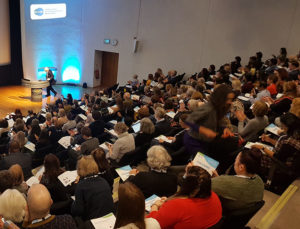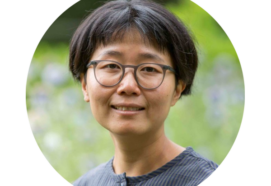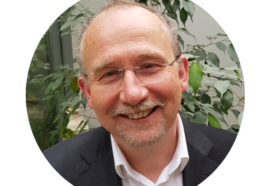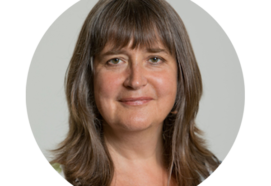From its earliest inception, The Association for Child and Adolescent Mental Health (ACAMH) has attracted a diverse range of professions and individuals – all with the shared aim of improving the mental health of children and young people. Its current board reflects that more than ever with an eclectic mix of clinicians and academics who have spent their careers working to help some of the most vulnerable in our society. One of the founding fathers of British child psychiatry, Emanuel Miller, also founded the Association for Child Psychiatry and Psychology which later became ACAMH. After visiting the 1954 International Congress of Child Psychiatry and Allied Disciplines he was inspired by the range of professionals who came together at the event and hoped to replicate this multi-disciplinary network in Britain.
The Association set out to bring together research findings and the clinical experiences of those working across child psychiatry and psychology. It quickly attracted many well-known figures from a range of disciplines including social worker Betty Irvine, John Bowlby, who developed attachment theory, paediatrician and psychoanalyst Donald Winnicott and psychologist Jack Tizard.

Research is key
Oxford University Professor of Educational Psychology Kathy Sylva, an ACAMH member of 30 years standing and its current President, has seen the organisation grow to even better reflect the varied disciplines of its members.
When Kathy first joined ACAMH it was primarily a scientific organisation, she said, which disseminated findings in child and adolescent mental health. Now, however, the organisation is placing a greater focus on putting that research to work both in terms of informing policy and helping to develop the skills of practitioners across the field. Kathy, who was also Chair for ACAMH from 2012 – 2015, has worked hard to make these changes happen.
“We really are taking a much more proactive stance in both policy and in practice and the development of practice. I think this is going to require more younger members, more members who are at the coal face working at clinics and in schools.
“With these young members combined with the more scholarly side I think we will be more able to have a direct impact on policy and on practice.”
Kathy’s academic work has two main strands, she has looked into the importance of pre-school and primary education and care and their effects on child development and also develops and assesses parenting interventions.
In 2010 she and a team of researchers were funded by the Department for Education to explore the effect of parents attending Sure Start children’s centres in England. Examining 121 children’s centres across England and 2,500 families who used them Kathy established the positive role of parents using these centres regularly on family function and parenting skill.
“We established a pattern that the families who had used more of the children’s services at a centre developed more skill at parenting, for example the home learning environment they provided to stimulate children’s intellectual development was better if they had used services in the centre compared to those who had used fewer or no services.”
In a more recent project, funded by the Sutton Trust, Kathy and colleagues found more than 1,000 of such centres had been closed between 2009 and 2017, with many drastically reducing the services they provide.
“I’ve followed through on the children’s centre research because we would really like to keep pressure on local and national government, we know financial times are tight, but to come up with innovative ways of keeping these centres open and offering services and support the earlier impact study showed really made a difference in children’s lives.”
Kathy has also carried out longitudinal research on the effects of pre-school, primary and secondary education in the EPPSE project.
In this work she studied 3,000 children, their families and schools and tracked their development from the age of three up to 18. She found that the family of a child and the school they attend play a vital role in development and her work on parenting programmes aims to help parents support their children throughout development.
One such study, the SPOKES (Supporting Parents on Kids Education in Schools) Programme, was developed by Kathy and ACAMH Chair Professor Stephen Scott. Parents attended sessions based on the Incredible Years programme, to help cope with children’s behaviour, and were taught strategies to help their children, all aged five and six, to read at home.
“We know that children who have behaviour problems are much, much more likely to go on to have reading problems.
“We looked at the effect of participating in this SPOKES programme which had a behaviour arm and a literacy arm. We found not only did children’s behaviour improve as a consequence of their coming to the group parenting sessions but also their reading improved.”
Evidence, evidence, evidence
Consultant Child and Adolescent Psychiatrist and ACAMH Chair, Professor Stephen Scott is a fervent advocate of implementing evidence-based parenting programmes working as Professor of Child Health and Behaviour within the Institute of Psychiatry, Psychology and Neuroscience at Kings College, London. He also works clinically for the CAMHS Adoption and Fostering Service and the Conduct Problem Service in South London and Maudsley NHS Foundation Trust.
Many adopted and fostered children, he said, have a terrible start in life, some of which might be due to genes, abuse and trauma and many have learning difficulties and disorders such as attention deficit hyperactivity disorder (ADHD).
“We see these children, we assess them, then try to do treatments which have been proven to work.”
 “One of my little hobby horses is just because they’re fostered and adopted doesn’t mean they’re from Mars and the usual things don’t work.
“One of my little hobby horses is just because they’re fostered and adopted doesn’t mean they’re from Mars and the usual things don’t work.
“There can be an over use of the word attachment disorder when in fact more ordinary things are going on which are amenable to treatment.”
In general Stephen’s research has looked into whether supporting parents to help their children works with a specific focus on disruptive children, as well as those who have been adopted or fostered.
“I’ve spent a lifetime doing trials of what works and we’ve found the skill of the practitioner is particularly important – more skilled practitioners get a good effect – and that early intervention in terms of age does help, it’s harder to treat adolescents but still not impossible.”
Conduct disorders and anti-social behaviour are widespread in children and young people, despite this, Stephen said, they remain an “unfashionable” group.
“Parents who have children who are misbehaving or being difficult at school or being excluded often feel shame and blamed even though there might be a major genetic contribution to it.
“There’s no pressure group or charity for them, even though it’s the commonest mental health problem we have in the country and worldwide.”
Stephen chaired a NICE guideline group in conjunction with the British Psychological Society on the evidence for parenting programmes and interventions for children with conduct problems. There is a great deal of evidence supporting the effectiveness of this type of intervention for families and young people but that isn’t always reflected in practice.
“What’s disappointing is there’s quite a lot of programmes out there which are based on the wrong theory, don’t have very skilled practitioners and sometimes have been shown not to work but still they’re being pedalled by people who have an interest. My own private view is that’s unethical.”
Stephen is passionate about disseminating evidence-based treatments; “One of the reasons I joined ACAMH was to try and get the message out, I think when you’re a busy clinician head down in the clinic you don’t have time to go telling people how fantastic the treatments are.
“The latest meta-analysis by John Weiss in Harvard found over 500 randomised control trials in our field for psychological treatments, there’s a huge evidence base and we’re bad at telling people about this.”
There is much to be done, Stephen said, during the rest of his time as chair of ACAMH but had already seen a great deal of change including a rebrand, and a move towards becoming a more outward-facing organisation.
Schools are crucial to a child’s mental health
ACAMH is known for its research dissemination through journals, The Journal of Child Psychology and Psychiatry (JCPP), and the journal of Child and Adolescent Mental Health (CAMH), Tamsin Ford, Professor of Child and Adolescent Psychiatry at the University of Exeter Medical School previously edited CAMH for six years and now sits on ACAMH’s board.
While Tamsin set out on her career path aiming to become an old age psychiatrist working as a clinician she ended up as a child psychiatrist working in research. Tamsin and her research group assess the effectiveness of services and interventions which aim to support the mental health and wellbeing of children and young people. She is also the lead for the medical school on integrated clinical academic training for junior doctors and medical students and is an honorary Consultant Child and Adolescent Psychiatrist at Devon Partnership Trust.

Tamsin’s early research repeatedly pointed to schools as a pivotal area for children’s mental health and subsequently she has recently focused on interventions for teachers.
The STARS project (supporting teachers and children in schools), Tamsin said, is one of her favourite studies.
This work was driven by the fact that the commonest mental health problem in children is behaviour that challenges others – around 5% of children in the UK meet diagnostic criteria for conduct disorder. Children who have been given that diagnosis have very poor outcomes later in life in terms of their mental health – many later develop substance abuse problems, personality disorders and depression and anxiety. Teachers struggle under the weight of coping with this kind of behaviour in the classroom – and the STARS project aimed to give primary school teachers better skills to manage disruption.
“I don’t think there’s another organisation that does quite what we do.”
The programme was developed from the Incredible Years programme, which in its original form had three strands; support for parents, children and teachers. STARS used the teacher strand to train 40 teachers from schools in Devon in behaviour management and Tamsin measured their professional self-efficacy, mental health and burnout and asked teachers to rate children’s attainment over three academic years.
Tamsin found that teachers felt the programme changed their practice and mindset as well as improving teacher-pupil relationships.
Improvements in the mental health of the children at baseline and reported levels of concentration and low-level disruptive behaviour all improved – an effect that was seen after children moved up an academic year under different teachers.
“We hope we’ve set up small improvements in children’s trajectories early on, though if they’re maintained over time, and for concentration and low-level disruptive behaviour they were, even though they weren’t then taught by a teacher familiar with the course in the next two years, maybe that translates to bigger effects further down the line.”
Tamsin joined ACAMH while training in child psychiatry and was drawn in by the diverse range of professions it brings together.
“The really big appeal of ACAMH is the fact it’s multi-disciplinary, and nothing I do clinically or academically is only psychiatry or only any other discipline.”
Tamsin said her six years as an Editor of CAMH have been invaluable to her own writing and research and encouraged anyone with a research interest to consider trying their hand at editing.
She added: “I think it’s a particularly interesting and exciting time to be part of ACAMH because I think we have a particularly vibrant board and vibrant back office and a commitment to continue professional development, wanting to get more involved actively in research rather than being the dissemination channel all of which is very exciting to see.
Highest scientific standards
The Journal of Child Psychology and Psychiatry (JCPP) – founded in 1960 has become one of the leading journals in the whole of psychiatry. Its Editor in Chief, Professor Edmund Sonuga-Barke, has worked hard since he joined the journal bringing together an editorial board of nine general editors, three review editors and five editors who review papers in more specialist areas.
“The journal has had enormous impact, our mission is to maintain the highest possible scientific standards we want to maintain the trust the field has with us, they see us as a very strong, quality-stamped journal.”

JCPP is currently ranked sixth out of all psychiatry journals in the world by the number of citations its articles have garnered.
“It’s quite an unbelievable achievement for quite a specific journal which focuses on kids while the others are general psychiatry journals.
“I’m very proud of that, it’s a real achievement by the team of editors, but we also have a wonderful set of people in the office supporting what we do.”
Edmund is also Professor of Developmental Psychology, Psychiatry and Neuroscience at Kings College, London and has spent much of his career exploring ADHD. Having dyslexia and ADHD himself, he says, has informed and motivated his research.
“I was always so ashamed of having learning problems until about five years ago. It changed because I was successful, I didn’t have to feel the stigma any more, and became much more open about it.
“I thought it was a bit embarrassing not having been a success at school but now I think it’s quite important, it tells people why I do some of the things the way I do and how I think.”
Edmund is currently moving towards examining the role of very early brain development in ADHD with an aim to use this knowledge to improve outcomes for people with the condition.
“I think there’s lots to be said for having a lot of energy and a mind that flits about, and so forth, the problem is all the downsides and the baggage that comes with it including emotional problems and conduct problems.
“If we can break that link and create a more fruitful pathway for people with ADHD traits I think that would be really important and that’s my aim, it’s a massive challenge for the field.”
ACAMH, Edmund said, is an interesting place that plays an important role in the dissemination of quality research, but a questioned remained over whether it should move towards influencing policy.
“To communicate to government you have to speak in sound bites, you can’t have the nuance and doubt. You have to make these bold statements about what is and isn’t true when you know in your heart it’s actually more nuanced than that and the effects are much more polychrome than black and white, it’s a big decision for us.”
Expert analysis
Consultant Nurse and Researcher Dr Cathy Laver- Bradbury, who specialises in ADHD, has worked alongside Edmund on research into the condition for the last 25 years. The New Forest Parenting programme, developed alongside Professor Margaret Thompson and Professor David Daley, was aimed at parents whose children show signs of ADHD before three-years-old.

“The aim with the New Forest Parenting Programme was to help parents whose children present with problems at three years old because we know that unless they receive help they almost always continue have problems at eight.”
Parents who took part learned about ADHD, the various cognitive processes behind certain behaviours and strategies to cope with problem behaviour with an eventual aim of improving family relationships.
Cathy, who is based at the University of Southampton and sits on ACAMH’s board, is also passionate about training clinicians in child and adolescent mental health.
Over the last 15 years she has been instrumental in developing a course on the Child and Adolescent Mental Health for student doctors and spends some of her working week teaching undergraduate medical students.
As a lifelong-lover of learning Cathy said she had found ACAMH an invaluable resource for research and workshops over the years and was glad to be invited to join the board. However, she said, she hoped in the future there would be more resources and events for clinicians who want to better apply theory to practice.
She said nurses and clinicians may feel the research isn’t directly relevant to their everyday work but the workshops and events ACAMH holds could be a way to increase that understanding.
The Branches reach
ACAMH has a network of branches across the UK, Ireland, and even one in Malta, which were previously overseen by Dr Mark Lovell, a Consultant Child and Adolescent Learning Disability Psychiatrist within Tees, Esk and Wear Valleys NHS Foundation Trust.
Mark, who is now the board’s ACAMH Lead for Continuing Professional Development and training, also works in autism assessment and teaching and part time as Chief Clinical Information Officer for the trust.
His involvement with ACAMH was something of a fluke – after arriving early for an ACAMH conference as a trainee he found himself in the midst of the branch annual meeting and was asked to become Chair.
He edited the organisation’s members’ magazine The Bridge and after teaching CAMHS staff in Malta helped set up ACAMH’s first branch outside the British Isles. Mark said the Malta branch had become a vibrant community within a country that provides little child mental health education.
“They have been really committed to putting on events, and not just with health professionals they’ve been drawing in teachers, educational psychologists and parents and have really taken ACAMH in their own country to quite new levels which we will probably be following suit with in the rest of ACAMH, we want to expand into events relating to education and social care and potentially events for parents.”
Mark was almost destined to work with children and young people with a specialism in learning disability psychiatry. His early years were spent helping at his dad’s outdoor pursuits centre working with children and adults with disabilities and additional needs. He could often be found at the back of his mum’s French class while she taught people with learning disabilities. Mark also volunteered with the charity Phab (Physically Handicapped Able-Bodied) teaching people with various disabilities how to ski.
“I would be literally strapped onto the back of a big toboggan hurtling down hills acting as a human anchor and once taught someone with brittle bone disease how to ski. She wanted to ski and took all the risk despite having a high likelihood of getting a broken bone by the end of it, luckily she didn’t.”
During his undergraduate medical training he took a year out to study psychology in relation to medicine which saw him pursuing a career in child learning disability psychiatry.
Mark said he aspires to work within a better world – where services meet the mental health needs of the population and one that funds services adequately to put the evidence base to better use in practice.
More than talking
Community Paediatrician Dr Max Davie was convinced to join ACAMH’s board by Mark Lovell, he admitted at first he was wary of joining what could be a talking shop.
“But immediately from the first meeting I attended it was clear to me this was not a talking shop but was an organisation that was really interested in engaging with the broader mental health community, was really interested in education, in challenge and in science.”
Max is designated doctor for education in Lambeth and runs the over-fives developmental assessment service – assessing children who may be struggling with their behaviour or social interactions which can lead to an ADHD or Autism Spectrum Disorder (ASD) diagnosis.
During his medical training Max took a special interest in neurodevelopmental conditions and has advocated for improving the CAMHs curriculum for trainee paediatricians.
“The picture for training in mental health within paediatrics has changed. We now do an annual course in mental health for paediatricians in the acute sector and community sector and the Paediatric Mental Health Association has grown over the last few years – our annual conference is now attracting about twice as many people.”

Max has helped to establish a place for CAMHS at the Royal College of Paediatrics and was appointed as its first mental health officer. He said he sees mental health issues in around half of his patients and added, more broadly, that mental health services needed to start seeing themselves as a holistic system rather than individual services.
Max also pointed to the lack of acknowledgment by the government that societal and economic disadvantage can lead to mental health issues, and the gradual dismantling of community services.
“Community support for families and young people is much less than it was around 10 years ago and I think that’s had a knock-on effect in all sorts of ways in shifting the curve in the wrong direction for children’s mental health, behaviour and wellbeing generally.”
Within ACAMH Max said he hoped to see more paediatricians joining as members and more joint events which involve paediatricians.
“…from the first meeting I attended it was clear to me this was not a talking shop but was an organisation that was really interested in engaging with the broader mental health community…”
Improved practice
Professor Gordon Harold from the University of Sussex is one of the newer faces on ACAMH’s board and joined as Treasurer in 2015. His role involves overseeing the charity’s accounts but he was brought into the fold by its mission statement.
“I joined to bring in a contribution to ACAMH that maps onto my research and practice interest which is to inform frontline practitioners around how research can lead to improved practice that benefits children.”
Gordon’s research is well-placed to do this – he has spent his career exploring the myriad genetic, neurodevelopmental and family influences that interact during a child’s development. Thanks to his early training and work in the USA, Gordon has tried to look beyond the simple mother-child relationships and into the deeper role of family relationships and genetics.
“My focus on family relationships specifically was sourced from trying to better understand the relative role of genetic factors then specific aspects of the rearing environment and to get past the definition of family influences on children as just being parenting.”

This interest in the role of genetics has also led him to become Director of Sussex University’s Rudd Centre for Adoption Research and Practice.
“Over the last 10 years we’ve looked at these questions around rearing and child mental health, and we’ve shown consistently that poor rearing experiences or positive rearing experiences work in the way you’d predict whether you’re genetically related or not.”
More specifically Gordon, rather than researching single factors that affect child development, looks at them as whole in what’s called a cascade of influences – how they work together in a cumulative way.
He gave the example of a family struggling under economic stress: “This stress can span multiple households, day to day making ends meet can lead to heightened levels of maternal and paternal depression which might lead to disrupted interparental relationships which might lead to poor parenting and poor outcomes.”
Given his interest in environmental influences on child development Gordon is keen to look into the potential impact, both positive and negative, of the digital world on children.
“The digital world presents a huge domain of the unknown… It’s one thing to talk to parents about nurturing, care-giving and positive interparental relations but then you have this whole new world that few parents fully understand.
“I think we need to understand it much better if we’re going to realistically look at how early rearing environments and the digital environment affect children’s mental health.”
The power of change
CEO of ACAMH Martin Pratt has overseen the transformation of the organisation since he was promoted from Member Services Manager in 2015. As a carer for an individual who has had mental illness Martin is passionate about working to improve the mental health of children and young people.
“It was incredibly liberating to join ACAMH. Not only could I put my experiences to good use but understanding more about mental health and working in an organisation whose primary task was to improve the lives and wellbeing of children was an absolutely amazing experience.”
He pointed to the last two years as being particularly transformative for ACAMH thanks to a process of change he set into motion upon becoming CEO. ACAMH’s brilliant board, he said, had been instrumental in supporting this change, as well as its team of office staff.
“Over the last year we’ve been very fortunate in being able to attracts a team of professionals to the office who have brought with them a diverse range of experiences and backgrounds.
“Each one of them has been pivotal in their own way in transforming ACAMH in to a more modern, outward facing organisation, putting us in an even stronger position to deliver on our mission of raising standards in the understanding and management of child mental health issues.”
ACAMH’s website is a hub of information, both for members and non-members, which includes accessible, digestible Topic Guides on a range of mental health topics, webcasts, podcasts, blogs, interviews with leading players in the sector, news articles, together with film and audio lectures from past events. Its social media presence has also seen growth with over 15,000 followers across Twitter, Facebook, and LinkedIn.
Other new initiatives included the addition of the ‘Essentials’ series of events which aims to attract a diverse range of professionals to learn about mental health topics in an accessible way.
Martin added: “Another notable first was the bespoke training put together for the Isle of Wight Council on gender identity. Following this successful pilot more initiatives of this type are to be expected.”
Martin has also introduced a new approach to leadership – the “managers of one” principle – whereby managers largely develop their own goals and direction and execute them independently within ACAMH’s broader strategic plan.

“On a personal level it’s been hugely liberating. On a business level it’s delivering results and lots of them through our new team, each of whom has brought with them initiative, entrepreneurial spirit, vision, and exceptional skills, all of whom have very quickly started to deliver on the three-year strategic vision we launched at the beginning of the year. There is now a genuine sense of ownership rather than just snatching glimpse of a wider plan.”
ACAMH is now one year into its 3-year strategic roadmap which Martin said has yielded real progress.
Over the coming years Martin said he hopes to build closer relationships with similar like-minded organisations throughout the world.
“We’ll be raising awareness of who we are, and what do, by getting out and meeting people who can benefit from ACAMH, by attending external conferences run by other organisations.”
Martin said he truly believes he has one of the best jobs in the world: “For me words just can’t do justice to the pride and importance I attach to working for ACAMH, I think I’ve got one of the best jobs in the world working with a team of professionals who are really, evidently passionate about their work and how it impacts on the wellbeing of children and adolescents.
“The excitement I had back then, working for an organisation at the cutting edge of the evidence base, remains with me to this day.”


